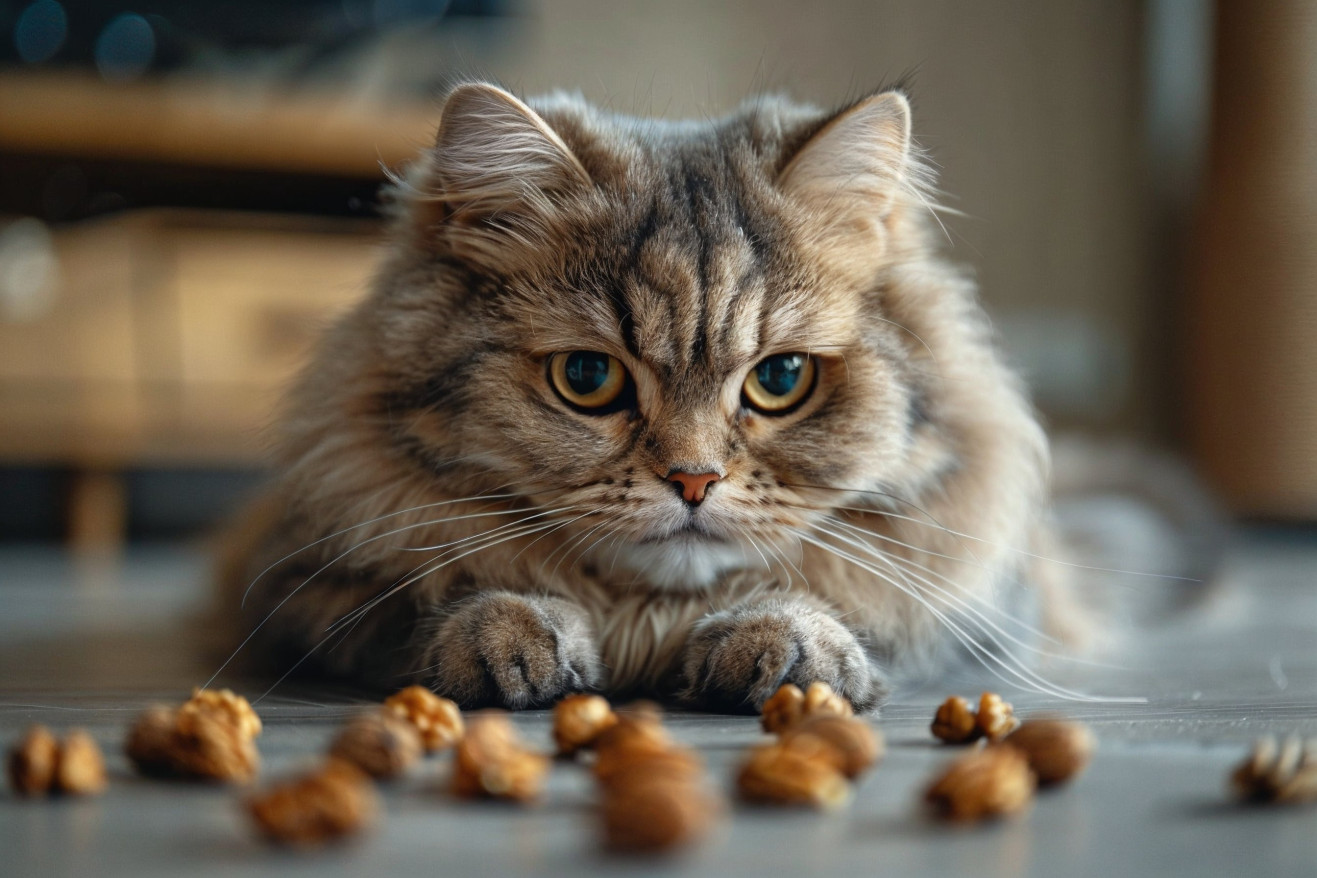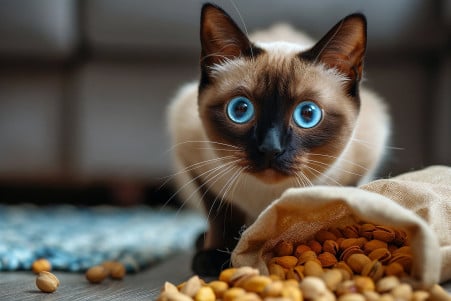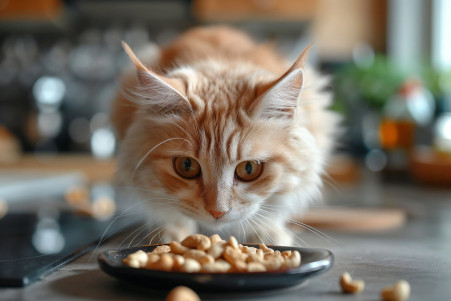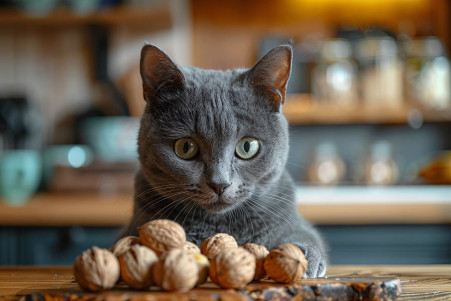Can Cats Eat Pecans? A Vet Weighs in on Nut Safety for Cats
16 April 2024 • Updated 15 April 2024

Pecans may be a delicious snack for humans, but can cats enjoy them too? Pecans are not safe for cats and can lead to a number of health issues including vomiting, diarrhea, and even pancreatitis if ingested in large amounts. It's best to opt for cat treats that are made with your cat's dietary needs in mind.
To get to the bottom of this question, we've gathered insights from a range of experts including veterinarians, pet nutrition specialists, and cat owners. This article covers the nutritional content of pecans, potential dangers, and the best ways to feed your cat, so you can determine whether or not you should add pecans to your cat's diet.
Can cats eat pecans?
Pecans' Nutritional Profile and Potential Dangers for Cats
Pecans are high in fat and calories, which can cause a variety of digestive issues for cats. According to Preventive Vet, pecans are also prone to mold, which can contain toxigenic and pathogenic fungal species that can cause seizures, nerve damage, vomiting, diarrhea and even life-threatening gastrointestinal blockages in cats.
Even if your cat avoids mold, the high fat content in pecans alone is dangerous - ManyPets explains that regularly eating high-fat nuts like pecans can lead to pancreatitis, which can be fatal. Pecans also contain juglone, a compound that Greg.app says can cause allergic reactions in cats. And the hard texture and tough shells make pecans a choking and intestinal blockage risk if cats eat them.
While pecans aren't necessarily toxic to cats, their high fat content, propensity for growing toxic molds, and the risk of choking and intestinal blockage from eating them makes them a dangerous treat for cats. It's important to keep your cat away from pecans to ensure their safety.
What to Do If Your Cat Eats Pecans
According to JustAnswer, if a cat eats a small amount of pecans, like a quarter of a pecan, it can lead to temporary stomach upset but is unlikely to cause any major problems. That said, cat owners should watch their pet closely for signs of gastrointestinal upset, including vomiting, diarrhea, loss of appetite, and lethargy after they eat pecans.
If your cat shows any signs of distress after eating pecans, it's important to call your vet right away, as they may need medical attention, according to Animal Gator. While pecans aren't very toxic to cats, it's important to get professional help to ensure that your cat doesn't experience any complications.
Even though pecans aren't as toxic as some other human foods, it's still best to avoid giving them to your cat whenever possible. Instead, you can give your cat some healthier, cat-friendly snacks.
Healthy, Cat-Safe Alternatives to Pecans
Cats are obligate carnivores, which means their bodies require a diet that consists mainly of animal-based proteins, according to the University of Missouri Small Animal Clinical Nutrition Service. As a result, the majority of a cat's diet should be made up of a high-quality, nutritionally complete commercial cat food that has been developed by veterinary nutritionists.
That said, Purina explains that cats can have treats or snacks in moderation. Healthy options that are safe for cats include cooked chicken, turkey, fish, eggs, and small amounts of sweet potato or pumpkin. BeChewy also lists apples, bananas, blueberries, and even a little cheese as safe options for cats.
Treats should account for no more than 10% of a cat's daily calories, and pet parents should work with their veterinarian to determine the right diet for their cat, according to WebMD. By giving your cat the right, cat-safe treats, you can help them enjoy their snacks while supporting their health and wellness.
Keeping Pecans Away From Cats: How to Prevent Accidental Ingestion
The Attainable Sustainable blog suggests that the best way to keep cats away from pecans is to put up a 2-foot plastic fence around the garden or the area where the pecan trees are located. However, the top of the fence should be left a little bit loose, as otherwise, cats can jump up and balance on the top of the fence before jumping down into the garden.
The Oregon State University also suggests using deterrents such as black bird netting, bamboo stakes, or natural oils to keep cats out of certain areas. Motion-activated sprinklers or planting cat-repelling plants like lavender or pennyroyal can also help keep cats away from pecan trees and gardens.
In addition, to help prevent accidental ingestion, make sure to keep pecans in airtight containers and clean up any spills or dropped nuts, as recommended by the experts. These steps can help pet owners protect their cats from the potential risks of eating pecans.
Other Nuts to Avoid or Limit for Cats
In addition to pecans, walnuts and macadamia nuts are also nuts that should be avoided for cats due to the fact that they can contain mold that is poisonous and lead to gastrointestinal upset, tremors, and seizures, according to Catster. Meanwhile, almonds, Brazil nuts, and cashews can lead to digestive upset in cats when consumed in large amounts, but they are safe for cats to eat in small amounts as an occasional treat, the site explains.
That said, TrustedHousesitters.com warns that cats should never be given nuts that are salted, roasted, or flavored, because the additives in these nuts can be toxic to cats. And, in general, it's a good idea to avoid giving cats nuts on a regular basis, as they are high in fat and can lead to obesity and other health issues if they are consumed in large quantities.
By learning which nuts are dangerous and which are okay for cats to eat in moderation, pet parents can make choices that are best for their feline friends.
Conclusion: How to Keep Your Cat Safe and Healthy
While pecans are not toxic to cats, their high fat content and tendency to grow mold make them an unsafe and inadvisable treat for felines, according to PetCube. Cats have specific nutritional needs that are best met through a balanced, high-quality commercial cat food formulated by veterinary professionals.
If your cat accidentally eats pecans, Catster recommends watching your pet for signs of gastrointestinal upset or other symptoms and contacting your veterinarian if you notice anything unusual. By knowing the dangers of pecans and other nuts and making sure your cat gets the right cat-safe treats and snacks, you can make sure you're taking the best care of your furry friend.


